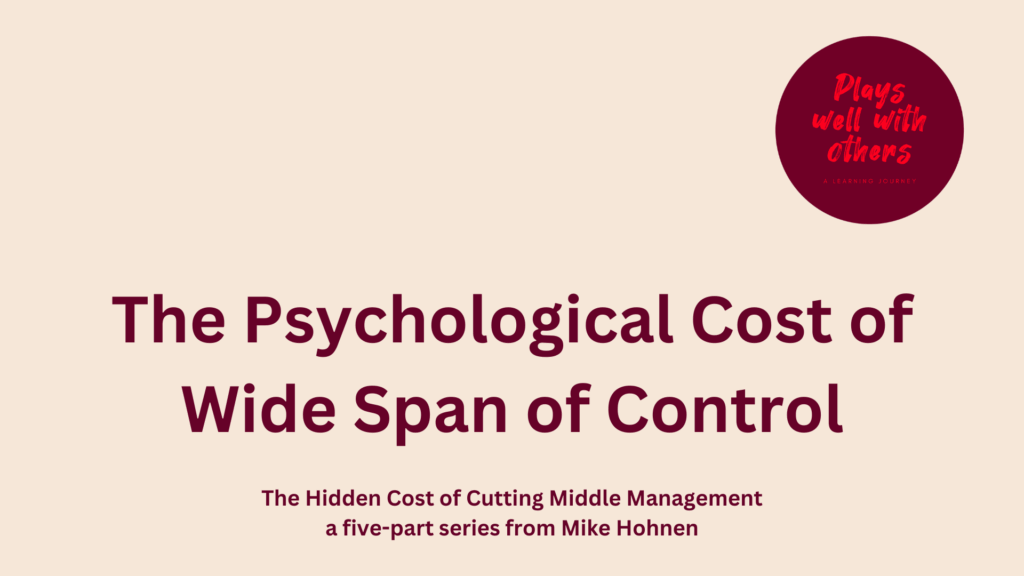Last week I wrote about the hidden costs of cutting middle management. Today I want to explore something deeper – the psychological toll this takes on everyone involved.
This crisis has a Janus face. It looks both ways, affecting managers and team members simultaneously, eroding something fundamental to human wellbeing at work: meaning.

? The Meaning Drain
For employees: They derive enormous meaning from their relationship with their supervisor. It’s where they find recognition, growth, support, and belonging. When that relationship becomes distant or transactional due to impossible spans of control, a crucial source of workplace meaning evaporates.
For managers: They derive deep job satisfaction from being genuinely helpful, from developing their people, from being seen as a “good” manager. When they’re spread so thin they can barely remember everyone’s names, let alone support their growth, their own sense of purpose crumbles.
They go from meaningful to meaningless.
What does meaninglessness feel like? That hollow, energy-draining sensation where work becomes a grind rather than a contribution. Where you feel invisible, replaceable, disconnected.
Meaninglessness doesn’t just affect productivity – it literally sucks the life force from people. And if left unchecked, it’s a straight path to burnout or depression.
? The Early Warning Signs We Miss
Here’s what breaks my heart: the early indicators are subtle, and by the time leaders notice someone is “struggling,” the psychological damage is often already done.
Watch for:
- The shift in energy – Playfulness erodes first. That lightness people bring to their work simply vanishes, replaced by a heavy, laboured quality. You can feel it in the room.
- Body language changes – Shoulders that carry invisible weight. Eyes that have lost their spark. The subtle withdrawal that says “I’m here but I’m not really here.”
- Drama triangles – People unconsciously creating victim-persecutor-rescuer dynamics because they’re desperately trying to generate some sense of agency or connection, even if it’s dysfunctional.
- Pervasive powerlessness – A sense that settles over teams like fog.
These aren’t performance issues. They’re human beings responding to an environment where their fundamental psychological needs for connection and meaning aren’t being met.
? The Cost of Catching It Late
The tragedy is that leaders often pride themselves on spotting these problems, but what they’re actually seeing is the end stage of a long erosion process.
They notice the disengagement, the decreased output, the attitude problems – but these are symptoms of months of slowly declining psychological safety and meaning.
By then, rebuilding trust and re-establishing meaning becomes exponentially harder. People don’t bounce back from psychological disconnection as easily as we’d like to believe.
?? The Path Forward
Here’s the thing: larger spans of control aren’t inherently wrong. I understand the business rationale – the economics make sense, and in many cases, it’s necessary.
But these structures can only work if managers fundamentally shift how they operate.
The challenge is that most managers have been brought up to focus on:
- Task execution
- Oversight
- Operational delivery
Now they need to transition to a completely different way of working – one centred on:
- Relationship building
- Empowerment
- Creating conditions for others to thrive
This isn’t a skill they can develop overnight or figure out alone. Someone needs to actively help them make this transition.
Because when managers learn to work relationally rather than operationally, larger spans don’t just become manageable – they become transformational.
? The Bottom Line
If we’re going to make these new organisational structures work, we need to become exquisitely attuned to these early psychological warning signs and actively support managers in becoming the relationship builders their expanded teams desperately need.
What early warning signs have you noticed when teams start to lose psychological connection?
Next week: How trust erodes invisibly – and what repair actually looks like.
#Leadership #PsychologicalSafety #Management #WorkplaceMeaning #MentalHealthAtWork #SpanOfControl #HumanCentredLeadership